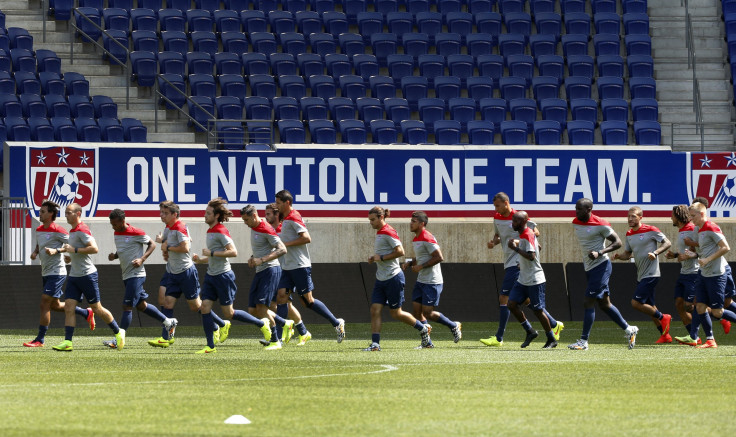World Cup 2014: Can US Survive Group That Includes Germany, Portugal And Ghana?

The United States has flown to Brazil on the back of arguably its most convincing performance of Jurgen Klinsmann’s near-three-year reign in charge of his adopted nation. There is a genuine sense of optimism surrounding the 23 players and the issue of Landon Donovan, to Klinsmann’s great relief, is fading ever more from the forefront of American minds.
But a look to final tune-ups for the U.S.’ group rivals in Brazil brings a sharp reminder of the scale of the task that awaits. Between them Germany, Portugal and Ghana, won their last pre-World Cup friendlies by a combined score of 15-2. The quality of the opposition means that three good performances may not be enough to prevent the U.S. going home at the earliest possible opportunity.
That, though, should not detract from a team moving in the right direction. Klinsmann has clearly been working toward changing the playing philosophy of the U.S. away from one which has seen the country’s teams far more comfortable playing the role of the spoiling underdog.
“It has to be our goal to develop a style in which Americans will recognize themselves,” Klinsmann told the New Yorker. “Americans are proactive. You want to be world leaders in everything you do. So, on the field, you shouldn’t just sit back and wait.”
Klinsmann has had success performing a similar task before. In 2006 he led home nation Germany at the World Cup on home soil, getting a new generation of players to shake off the dour reputation of the country’s recent teams and thrill supporters en route to a credible semifinal berth. The tools at his disposal clearly make that task far tougher this time around.
Leading into the World Cup, the key challenge for Klinsmann has been getting the balance right. It would be foolish to go in with a gung-ho approach against the strength of opposition the U.S. will face at the World Cup. The introduction of a diamond midfield has been designed to make the U.S. more offensively potent by harnessing the attacking talents of the team’s best player, Michael Bradley.
The match with Turkey 10 days ago showed both the positives and the drawbacks of that particular system. Bradley’s delightful pass for forward-surging full-back Fabian Johnson led to the opening goal in a 2-1 win. But the final score masked just how open the U.S. was in transition, especially in the first half. Turkey could have scored five. Ghana, Germany and Portugal likely will not be so profligate.
To his credit, Klinsmann acknowledged this problem. In the following game against Nigeria, the diamond remained, but it was now far more compact. The presence of natural-holder Kyle Beckerman at the base and former anchorman Jermaine Jones narrow on the left added far more reinforcement, which, together with the defensively diligent Alejandro Bedoya on the right, allowed Bradley even more freedom to influence the game high up the pitch.
The U.S. was happy to concede possession, but buzzed around opponents with the ball and carried a threat when winning it back. It is a strategy that gives the team the best chance of success against its strong group-stage opponents.
Also counting in the U.S.’ favor was just how much fitter its players looked then Nigerias. While Klinsmann may have worried that Bradley and captain Clint Dempsey would lose a competitive edge ahead of the World Cup following moves back to Major League Soccer, it has undeniably left them fitter for not playing a grueling European season. Together with Jozy Altidore, who looked sharp and hungry to impress after hardly featuring for Sunderland late in the season, the U.S. could have a significant advantage in the draining conditions that will be encountered in the north of Brazil.
Clearly, though, it might not be good enough. Key for the U.S. is to win the opening match with old foe Ghana next Monday in Natal. The greater solidity showed against Nigeria will be crucial against a side whose undeniable strength is on the break, with the likes of Asamoah Gyan, the Ayew brothers -- Andre and Jordan -- and Kevin-Prince Boateng. Jordan Ayew hit a hat-trick on Monday as Ghana tore apart a sloppy South Korea side. Such ill-discipline cannot be forthcoming from the U.S, where its flanks will be particularly under threat.
Navigate past Ghana and things do not get any easier. Doubts about the participation of Ballon d’Or winner Cristiano Ronaldo as well as the ability of his supporting cast appeared to be answered in a thrilling 5-1 over the Republic of Ireland on Tuesday. However, it cannot be ignored that Portugal stuttered through qualifying, while the team’s attack is massively reliant on a surely not fully-fit Ronaldo -- a player who has often cut a frustrated figure at previous tournaments.
Germany, too, enter the tournament with question marks and fitness concerns. Marco Reus has been ruled out of the tournament through injury, as previously were Lars Bender and Marcel Schmelzer. Meanwhile, key trio Manuel Neuer, Philipp Lahm and Bastian Schweinsteiger all have fitness doubts, while the equally influential Sami Khedira has only just returned from a serious knee injury.
Immense quality undoubtedly remains, as was shown with a 6-1 in over Armenia. And Klinsmann will be hoping that when he leads out his adopted nation against his home one in its final group match, the U.S. has already gone a long way to securing its place in the last 16. That now looks a more probable proposition than it did when the horror draw was made last December.
© Copyright IBTimes 2024. All rights reserved.





















